Of Desert Nights and Rising Stars
Published: 19 June 2015
USP has a long standing relationship with the Virginia G. Piper Center for Creative Writing at Arizona State University (ASU). In February 2015, upon the center’s invitation, two USP students attended the “Desert Nights, Rising Stars” Writers Conference 2015 in ASU. The conference provided an opportunity for participants to exchange ideas and share an appreciation for literature and writing. Here, Mark Seow (Life Sciences + USP, Class of 2015) and Salome Choa (English Literature + USP, Class of 2016) tell us about their experience as participants of the conference.
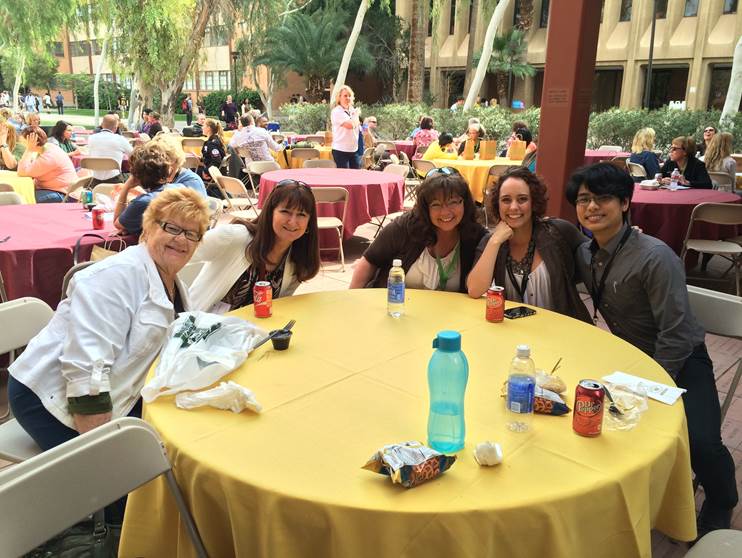
Mark (far right) making new friends over lunch at the conference, photo taken by Salome!
"I would look back on the experience as a key milestone in my writing journey... I ironically returned from an American writers’ conference with an insatiable urge to consume and learn from writings originating from Singapore, other Asian backgrounds and non-American/British writers." - Mark Seow (Life Sciences + USP, Class of 2015)
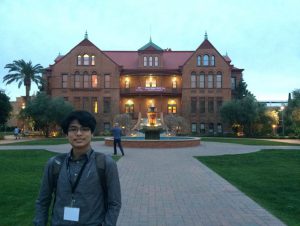
Mark in front of Old Main at Arizona State University on the last day of the conference.
Prior to attending the conference, I felt that my journey as a writer was a solitary pursuit. I didn’t know anyone who wanted to write fiction, much less commercial fantasy fiction. The conference was a valuable opportunity, since it brought together many writers of different genres and aspirations.
Instead of having to defend my passion for fantasy/sci-fi writing, I found myself sharing the same interests with many. Through the common love for the written word in all its diverse forms, I felt part of a greater community.
I left with the knowledge that writers from other parts of the world share the common struggle and ambition.
This experience and realisation was both comforting and uplifting, spurring me on to not give up on my dream to be a writer. This came from the personal interactions with writers of various backgrounds – a psychology major sacrificed her own time to write a novel, a seventy-year-old grandmother who was pursuing her degree, a journalist who left a faculty position to publish war novels.
Some gave advice, some exchanged writing woes, and some encouraged to “just go and get published.” Holistically, this doesn’t just give me perspective on how different people approach the same ambition, but also tells me to have faith in my own writing path.
The format of the conference was flexible and covered many genres. The diversity of workshops available helped nourish a wide literary diet, and facilitated cross-genre learning. I wouldn’t have guessed that principles of poetry could be transferred to short fiction, or that certain great questions of art pervade all forms of writing. It would be an understatement to say that I returned with broadened perspectives and literary appetites. I returned with not just new answers to thinking about writing, but even more, greater questions that will continue to inform my artistic attitude.
As most participants at the conference were of a white cultural background, it reminded me that the literature that we typically consume is dominated by American and British writers. My Southeast Asian cultural background and literary tradition was suddenly thrown into sharp relief against this backdrop. I ironically returned from an American writers’ conference with an insatiable urge to consume and learn from writings originating from Singapore, other Asian backgrounds and non-American/British writers. While this revelation was not at all what I expected to learn from the conference, it is possibly one of the more important.
This is not only something that will feed my writing – as I try to capitalise on my cultural background to write “globality” fiction – but also something that better informs me as a citizen of Southeast Asia who comes from a different socio-economic and political environment. I have since embarked on a journey to discover hidden gems of Southeast Asian literature and to uncover my cultural blindspots.
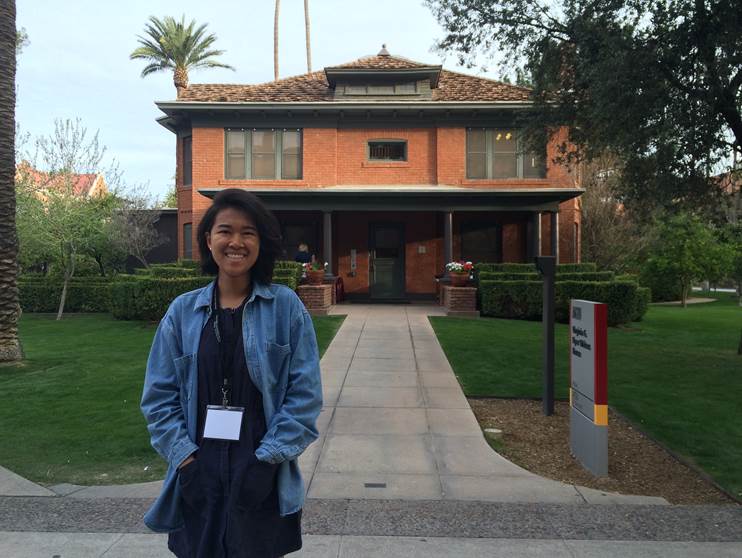
Salome in front of the Virginia G. Piper Writers House.
“I had the privilege of discussing love poetry with a 73 year-old undergraduate, offering ideas to an Alaskan banker for his first novel, disagreeing over American hip hop culture’s influence on East Asian hip hop lyrics with a Venezuelan-bred Hongkonger and lamenting over the literacy rates of primary school children with a fellow Singaporean.”
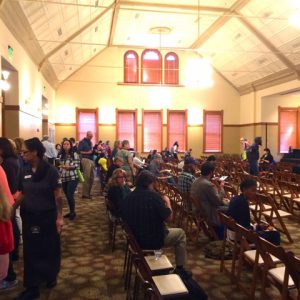
Conference’s opening session to meet and mingle with other participants over light refreshment
The Desert Nights, Rising Stars conference was something to look forward to in the middle of the hectic semester in February. Besides my anticipation of the conference, the idea of enduring a twenty-hour flight to attend a three-day conference over Chinese New Year in a time zone fifteen hours behind Singapore made me determined to fully utilise every moment of this opportunity. It was this potent combination of enthusiasm and resolution that got me ready for Day 1 of the conference on three hours of sleep and no caffeine.
The conference was focused, fuss-free and fast-paced since the participants, like me, came for the conference with the sole intent of immersing themselves in the written word: the creative process behind it, the critical act of editing it, and the collective stance of sharing it.
Every day, participants attended three hour-long craft classes, broke for lunch, attended another session of three hour-long craft classes, and then gathered together for an hour’s reading by established poets and writers. The craft classes took on a wide swathe of writing topics, ranging from commercial writing, poetry, publishing and revising work.
Some classes required on-the-spot writing and others demanded furious note taking, but all classes were framed to engage the participants, either through addressing concerns or igniting debates.
Through the conference, I found myself appreciating the process of commercial writing, understanding the necessity of revisions in poetry and revelling more in the simultaneous comfort, joy and power of words.
It was not only the conference proper that framed my experience. The Piper Centre intended to create a community of writers through this conference and a large part of it was accomplished through informal interactions during the day.
I had the privilege of discussing love poetry with a 73 year-old undergraduate, offering ideas to an Alaskan banker for his first novel, disagreeing over American hip hop culture’s influence on East Asian hip hop lyrics with a Venezuelan-bred Hongkonger and lamenting over the literacy rates of primary school children with a fellow Singaporean.
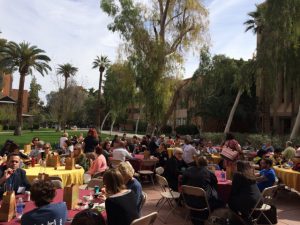
Conference participants and speakers having lunch together under the Arizonian sun.
While most of the participants identified themselves as writers or poets – unpublished or otherwise – there were some who simply loved writing and the creative power of words. Both groups could find their place in the conference. I certainly did.
The conference offered me an immersive experience by protecting this precious pocket of time to discuss, debate and appreciate the written word with other (mostly) likeminded individuals.
My writing sensibilities came away refined and redefined by these writers, poets and appreciators, and I like to think that I had a shaping influence on their writing as well.
The three days I spent in the conference confirmed the importance of writing and the word, and it was this thought that sustained me on the twenty-hour flight back and the jet-lag that followed, with unread readings and unwritten essays waiting for me.

